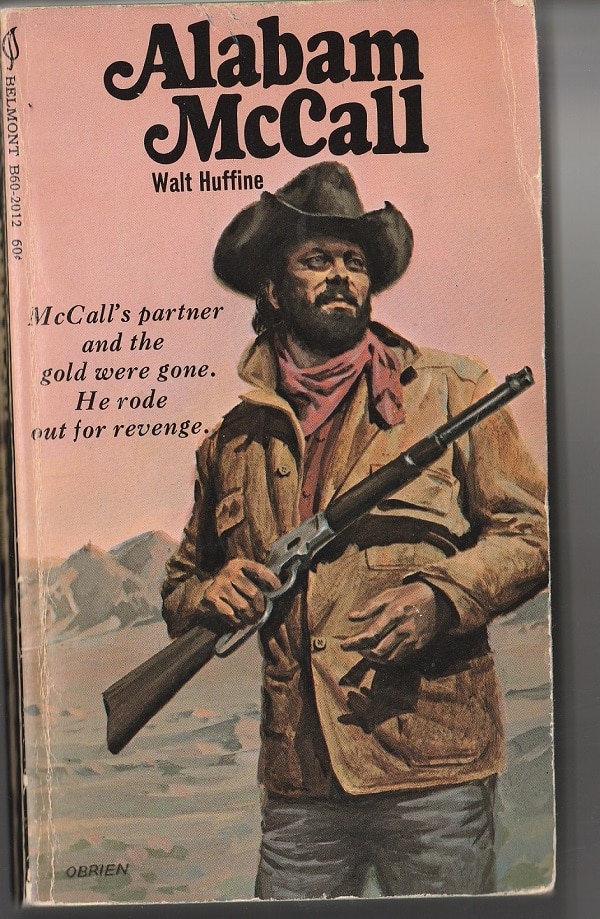Well, I was at the Newberry Library Book Fair at the end of July, and my eye was caught by the cover of Walt Huffine’s 1970 Alabam McCall. It showed a tough, heavily tanned, hulking guy with a rifle, a dusty black hat and a thick black beard, standing in the midst of what looked like an arid western landscape.
Then, there were the words on the cover: “McCall’s partner and the gold were gone. He rode out for revenge.”
And I was most drawn by the title character’s name.

I guess I’m just a wide-eyed Northerner when it comes to names evoking the South, especially a name such as Alabam. I thought that this guy just had to be a real character.
Well, as is said, I shouldn’t have judged this book by its cover. Alabam McCall was diverting in, at best, a C-minus sort of way.
I shouldn’t complain. It only cost me a buck.
“Out for revenge”
I’d hoped for Alabam to be quirky in nuanced human ways. Instead, he’s the sort of guy who has all the money he needs and can do anything he needs to do and can’t ever be shot, except for two flesh wounds. A stick-figure kind of guy.
My other hopes had to do with him riding “out for revenge.” I pictured something like the brooding and beautiful 1958 movie The Bravados, starting Gregory Peck as a cowboy bent on revenge.
The movie was based on a novel of the same name, published the year before by Frank O’Rourke. The book is both simpler and more complex than the film, and not as good. Nonetheless, it has a nice pace and rhythm to it as the cowboy is searching across the western landscape for the bad guys.
In Huffine’s novel, Alabam doesn’t go out looking for revenge.
Instead, he comes back to the town of Longhorn where he and his partner were once accused of rape and where his partner was gunned down. No one recognizes him because, in the intervening time, he’s gotten a shave and a haircut and doesn’t look like the big hairy galoot who’d been arrested.
Well, maybe.
Suspending disbelief
The reader has to suspend disbelief for a lot of this book.
In addition, the novel is pretty hackneyed, awash with cliches. Indeed, it got so I was having fun with each new cliché that popped up.
Such as Alabam’s flesh wounds, and his ability to spot every trap, and his skill at shooting better than any bad guys, and the way he always seemed to be able to break out of jail (three times), and how the baddest of the bad guys kept heaping badness upon badness, turning the town into a vice den, arranging a rustling operation, beating up a woman (two times), and hiring an odd-looking bodyguard named Spider.
There’s also a sloppiness with the facts of the story: Were the kidnapped men taken to a cabin or a cave? Was it five men or four who cornered Alabam in a shack?
First and last book
After buying the book, I looked around on the internet to find out what else Huffine had written but couldn’t find anything.
It certainly seems like Alabam McCall was his first and last book.
I can understand why. It’s a novel without a clear drive to its narrative. Huffine just piles incident upon incident, and there are a great many things that don’t make sense.
Ah, well, what did I expect for a dollar?
.
Patrick T. Reardon
8.9.22
Written by : Patrick T. Reardon
For more than three decades Patrick T. Reardon was an urban affairs writer, a feature writer, a columnist, and an editor for the Chicago Tribune. In 2000 he was one of a team of 50 staff members who won a Pulitzer Prize for explanatory reporting. Now a freelance writer and poet, he has contributed chapters to several books and is the author of Faith Stripped to Its Essence. His website is https://patricktreardon.com/.
